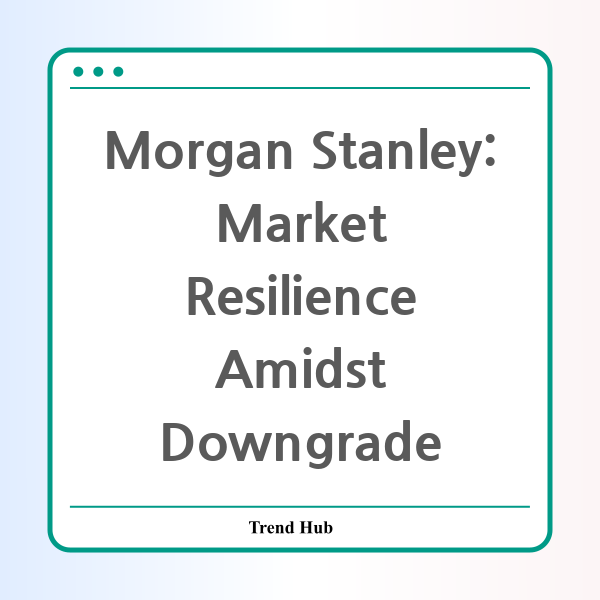* This website participates in the Amazon Affiliate Program and earns from qualifying purchases.

As the stock market continues its upward trajectory, questions linger: How are investors navigating the recent turbulence caused by Moody's downgrade of the U.S. credit rating? Morgan Stanley, a key player in the financial landscape, stands at the nexus of these developments, providing valuable insights into market movements and investor behavior.
The latest news reveals a significant win streak for the S&P 500, marking a six-day rise with the tech-heavy Nasdaq and the Dow Jones also climbing. Investors seem to be shaking off the implications of Moody's decision to lower the U.S. government's long-term credit rating from AAA to AA1, indicating a shift in perspectives within the market. The downgrade, attributed to escalating deficits and refinancing burdens amid elevated interest rates, has raised eyebrows but not panic across Wall Street.
Despite the downgrade, major indices showed resilience. The S&P 500 managed to push past previous levels of resistance, closing above the flatline and extending its winning streak. The Dow Jones Industrial Average saw a modest increase of 0.3%, while the Nasdaq also enjoyed a slight uptick. This resilient performance suggests that investors are cautiously optimistic, continuing to engage with the market even as they digest the implications of the changes in credit ratings.
Investor behavior is influenced by several factors, not the least of which are rising Treasury yields. Recently, the 30-year Treasury yield briefly surpassed the pivotal 5% mark, the highest seen since late 2023. Initially, this surge raised concerns among investors regarding the financial markets' stability. However, as the day progressed, yields began to ease, reflecting a collective move towards bond buying, which is generally viewed as a stabilizing action.
Moody's downgrade, while significant, appears to have lost some of its sting as market participants reassess the broader economic landscape. With the agency joining Fitch and S&P in lowering the U.S.'s credit standing, the market is grappling with the potential long-term effects of ongoing fiscal imbalances and rising interest costs. Moody's reasoning for its downgrade underscores the growing burden of U.S. debt financing, which has been exacerbated by recent fiscal policies and a lack of meaningful resolution from Congress.
Moreover, Treasury Secretary Scott Bessent's warnings regarding tariffs highlight the precarious balance the U.S. must strike in its international trade agreements. His statement reflects a growing urgency to negotiate with key trading partners or face the reinstatement of tariffs—a move that could further complicate the economic landscape.
The week's economic calendar appears light, with few scheduled announcements. However, investors remain vigilant, particularly regarding upcoming manufacturing data and initial jobless claims, which could provide critical insights into the overall economic health moving forward.
As earnings reports from retail giants like Target and Home Depot are anticipated later in the week, the focus will likely shift to these sector-specific performances. Analysts at Morgan Stanley may provide enhanced clarity and guidance on how these developments will impact consumer sentiment and spending, which are crucial for economic recovery.
In conclusion, while the landscape is fraught with challenges stemming from the credit downgrade and rising yields, the market has shown remarkable resilience. Investors are advised to stay informed and consider diversifying their portfolios as new data and trends emerge. As always, the insights from financial powerhouses like Morgan Stanley will be instrumental in navigating these turbulent waters.
* This website participates in the Amazon Affiliate Program and earns from qualifying purchases.